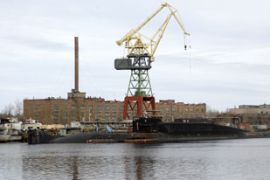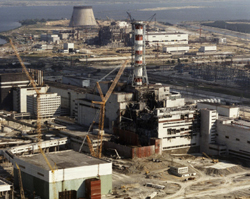Russia plans floating nuclear plant
Greenpeace says plan is the “most dangerous” nuclear project over the last decade.

Officials from Rosatom, the state nuclear energy agency, said that the plants would be based around nuclear reactors already used to power Russian ice-breaking ships and military submarines.
“If today we are building low-capacity floating N[uclear] P[ower] P[lant]s based on 70 megawatt ice-breaker reactors, tomorrow, we will start building medium-capacity plants based on unique technologies designed for nuclear submarines, i.e. 300-400 MW,” Sergey Kiriyenko, the head of Rosatom, said.
“This is a unique potential in both Russian and world power engineering. We have unique competitive advantages: no other country in the world had so many reactor-years and such a unique nuclear fleet as we did.
“Our experience is unique. Today many countries are seeking to build low- and medium-capacity reactors, but they are lagging behind us.”
Greenpeace disapproval
 |
| The 1986 Chernobyl disaster dealt a massive blow to Russia’s nuclear ambitions [AFP] |
Greenpeace, the environmental pressure group, voiced its disapproval of Russia’s plans.
“This is the most dangerous project that has been launched by the atomic sector in the whole world over the past decade,” Ivan Blokov, the campaign director of Greenpeace Russia, said.
“It is scary as this is basically going to be a floating atomic bomb.”
Vladimir Putin, the Russian president, last year approved the biggest revamp of the Russian nuclear industry since the 1986 Chernobyl accident which spewed radioactive material over much of Europe.
On Sunday, Ivanov unveiled Russia’s first new generation nuclear submarine since the fall of the Soviet Union.